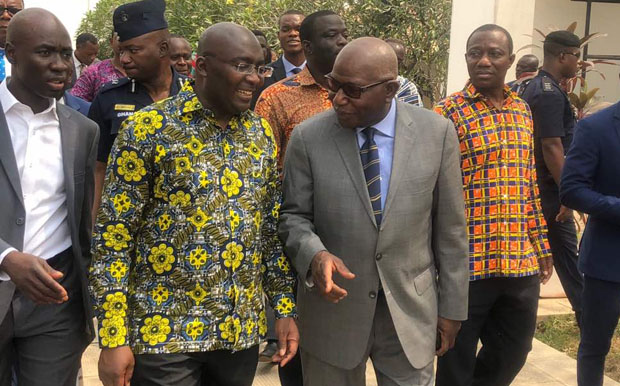Vice President Dr Mahamadu Bawumia
Government and the people of Ghana have been asked to take responsibility for the nation’s economic growth and transformation in a new partnership with developmental partners.
Vice President Dr Mahamadu Bawumia, who made the call, was speaking at the 69th Annual New Year School and Conference at the University of Ghana lately.
According to him, government envisages a paradigm shift where trade, private capital flows, strategic political cooperation and partnership, as well as domestic resource mobilization, would become the driving force of the country’s development.
The conference discussed “Job Creation for Accelerated Development – The Role of the Private Sector” as a theme.
Achievements
The Vice President noted that a year after taking office, the New Patriotic Party (NPP) administration had grown the economy from 3.7 percent in 2016 to an estimated 7.9 percent in 2017.
“This is the best annual real GDP growth for the first year of any new government since 1992.”
Also, he said while agriculture growth increased from 3.0 percent in 2016 to a projected 4.3 percent in 2017, industry growth increased from -0.5 percent in 2016 to 17.7 percent at the end of 2017 underpinned by increased petroleum production.
Services sector
“The services sector growth is projected to decline from 5.7 percent in 2016 to 4.7 percent in 2017; Non-Oil GDP growth is projected to marginally decline from 4.9 percent in 2016 to 4.8 percent in 2017; inflation declined from 15.4 percent in 2016 to 11.8 percent in 2017; interest rates on the 91-day treasury bills declined from 16.8 percent in 2016 to 13.3 percent in December 2017.”
Prime rate
He said the Bank of Ghana Monetary Policy Rate saw a year-on-year reduction from 25.5 percent by end-2016 to 20 percent by end-2017.
“This is the largest single year reduction in the monetary policy rate since 2001 and since the onset of the Bank of Ghana’s inflation targeting regime.”
External payments status
He also said Ghana’s external payments position had strengthened.
“The trade account recorded a surplus of $646 million (1.4 percent of GDP) as at September 2017 compared to a deficit of $2.0 billion (4.7 percent of GDP) for the same period in 2016.
“Our gross international reserves increased from $6.2 billion in December 2016 (3.5 months of imports) to $7.4 billion as at 24th November 2017 (4.1 months of imports). The exchange rate of the cedi to the US dollar remained relatively stable, depreciating by 4.6 percent in 2017.
Credit assessment
“Ghana’s sovereign credit rating has improved with Fitch ratings changing Ghana’s B rating outlook from “Negative” to “Stable” while S&P changed Ghana’s outlook from Stable to Positive.”
Furthermore, he said the primary balance also posted a surplus for 2017 compared to the deficit recorded in 2017, adding that Ghana’s debt to GDP ratio declined for the first time since 2007 from 73 percent of GDP in 2016 to some 70 percent in 2017.
Debt
“The rate of accumulation of Ghana’s debt stock has also declined significantly. The annual average rate of debt accumulation of 36 percent over the last four years declined to 13.58 percent in the first four months of 2017.”
By Samuel Boadi


